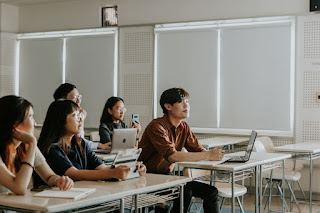The Future of Education: Exploring Emerging possibilities and Technologies
The field of education is on the brink of a major transformation, driven by the rapid advancements in technology and the evolving needs of learners. As we delve into the future, new possibilities emerge, reshaping the way we acquire knowledge and skills. With the advent of artificial intelligence, virtual reality, and other emerging technologies, the traditional classroom is evolving into a dynamic and immersive learning environment.
One of the key aspects of this future educational landscape is the
personalized learning experience. With AI-powered algorithms, educators can
tailor instructional content and assessments to individual student needs,
allowing for a more efficient and effective learning process. Furthermore, the
integration of virtual reality and augmented reality technologies offers
students the opportunity to engage in immersive experiences, transporting them
to different times, places, and scenarios that were previously unimaginable.
Another significant development is the rise of online education. The accessibility and convenience of online courses have opened up new avenues for learners of all ages. From remote learning to lifelong learning, the internet has become a vast repository of knowledge, offering a plethora of courses and resources at one's fingertips. However, this digital landscape also brings challenges such as ensuring the integrity of online assessments. Students may be tempted to seek shortcuts, including the option to
pay someone to do my online exams. Educational institutions and technology providers must work together to develop robust systems that prevent cheating while maintaining the flexibility and accessibility of online education.
Education is the cornerstone of society, shaping the
minds of future generations and driving progress in various fields. As we stand
on the cusp of a technological revolution, it is evident that the future of
education holds immense potential. Emerging possibilities and technologies are
transforming traditional learning methods, enabling personalized learning
experiences and bridging gaps in accessibility. In this blog, we will explore
the exciting advancements that will shape the future of education and their potential
impact on learners worldwide.
Traditional
Education vs. Modern Education:
Traditional education has long been the cornerstone of
our educational systems, following a structured approach with physical
classrooms and face-to-face interactions. However, with the advent of modern
education, innovative technologies and digital platforms are revolutionizing
the way educational content is accessed and delivered.
Evolution of
Education Systems:
The traditional education system has its roots deep in
history, emphasizing in-person lectures and rote memorization. However, modern
education is taking a more learner-centered approach, leveraging technology to
create personalized learning experiences that cater to individual needs and
preferences. From online courses and virtual classrooms to interactive learning
tools, the education landscape is witnessing a transformative change.
Challenges and
Limitations of Traditional Education:
Traditional education faces several limitations,
including limited access to quality education due to physical distance and
financial constraints. Additionally, the one-size-fits-all approach may not
effectively cater to individual learning styles and speeds. Furthermore, the
rapid pace at which knowledge and information are evolving necessitates a more
adaptable and dynamic educational framework.
Benefits of
Modern Education:
Modern education brings with it a host of benefits
that have the potential to revolutionize learning. With online platforms and
virtual classrooms, education is becoming more accessible and affordable,
empowering learners from diverse backgrounds. New technologies, such as
artificial intelligence and virtual reality, are enhancing the learning
experience, making it more immersive, engaging, and interactive. Gamification
and adaptive learning platforms are also optimizing learning outcomes by
personalizing the educational journey for each student.
Emerging
Possibilities:
The future of education holds immense promise, with
emerging technologies poised to disrupt traditional educational models.
Artificial intelligence has the potential to revolutionize assessments by
providing personalized feedback and adaptive learning experiences. Augmented
reality and virtual reality can transport students to immersive learning environments,
transcending the limitations of physical classrooms. Furthermore, the
integration of big data and analytics will enable educators to gain valuable
insights into student performance and tailor instruction accordingly.
Advancements in
Technology and Education:
Technology has played a vital role in reshaping
various industries, and education is no exception. We will explore how
technology is transforming the education landscape, enabling educators to
provide engaging experiences and enhancing learning outcomes. The integration
of emerging technologies, such as artificial intelligence and virtual reality,
will also be discussed.
Personalized
Learning and Adaptive Education:
One size does not fit all when it comes to education.
Personalized learning recognizes the unique learning needs of students and
tailors the educational experience accordingly. We will delve into the concept
of individualized learning and the role of adaptive learning platforms in
providing personalized education.
Virtual Reality
and Augmented Reality in Education:
Immersive technologies like virtual reality (VR) and
augmented reality (AR) have gained momentum in recent years. We will explore
how these technologies can create immersive learning experiences and discuss
their potential applications and benefits in education.
Artificial
Intelligence and Machine Learning in Education:
Artificial intelligence (AI) and machine learning (ML)
have the potential to reshape education by providing intelligent tutoring,
personalized feedback, and adaptive assessments. We will examine AI-powered
education platforms and tools that enhance personalized learning and student
outcomes.
Online
Education and E-Learning:
The rise of online education platforms has enabled
access to quality education regardless of geographical barriers. We will
analyze the benefits and drawbacks of e-learning and discuss the ways in which
online education is transforming traditional educational models.
Future Skills
and Job Market:
The future job market will demand a different set of
skills. We will discuss the changing skill requirements and the need to bridge
the gap between education and employment. It is crucial to equip students with
the skills that will make them future-ready.
The Role of
Teachers and Educators:
In the digital age, the role of teachers and educators
is undergoing significant changes. We will explore the shifting roles and
responsibilities and highlight the importance of maintaining a strong
teacher-student connection in the face of technological advancements.
Ethical
Considerations and Challenges:
As technology becomes deeply intertwined with
education, ethical considerations arise. We will examine the importance of data
privacy and security in education and discuss the challenges surrounding equity
and accessibility in a technology-driven educational landscape.
The Future of
Education: Opportunities and Challenges:
The future of education opens up a world of
possibilities, but it also presents challenges. We will explore the potential
benefits and disruptions that lie ahead and discuss strategies for embracing
the future of education effectively.
Conclusion:
In conclusion, the future of education holds exciting
possibilities and technologies that have the potential to revolutionize the way
we learn and teach. By embracing these emerging technologies and adapting our
educational systems accordingly, we can create a future where education is more
accessible, engaging, and effective for all.
Furthermore, the future of education will likely see a
shift towards a more personalized and student-centered approach. With the help
of big data analytics and machine learning algorithms, educators can gain
valuable insights into each student's learning patterns, strengths, and
weaknesses. This allows for the development of tailored learning experiences
and interventions that address individual needs, ensuring that every student
can thrive academically.



Comments
Post a Comment